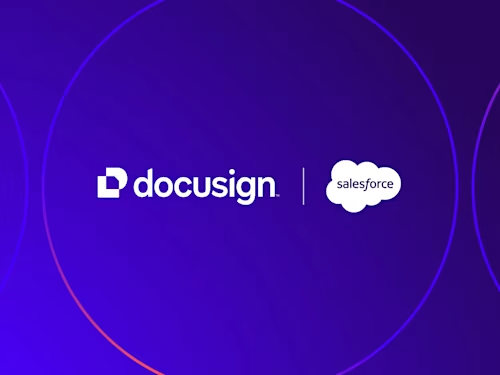
Como as assinaturas eletrônicas ajudam as equipes de RH do setor de manufatura
Uma lista de recursos de assinatura eletrônica para inspirar equipes de RH a pensar em como você pode enfrentar os principais desafios atuais

O setor de manufatura está em constante mudança e passou por diversos desafios em 2021, incluindo a interrupção da cadeia de fornecimento, falta de mão de obra e a necessidade de transformação digital. Dito isto, as equipes de RH e os gerentes de fábrica do setor de manufatura possuem seus próprios desafios no que se refere à contratação, à retenção e ao gerenciamento da força de trabalho na fábrica. Sindicatos e greves, segurança dos funcionários, lacunas nas competências e desafios de comunicação no chão de fábrica são algumas das situações com as quais o RH desse setor deve lidar. Sem mencionar a contínua escassez de mão de obra e desafios de recrutamento da próxima geração de funcionários que possuem diferentes expectativas de um empregador.
Se você trabalha no RH, provavelmente já está familiarizado com as ferramentas de assinatura eletrônica que podem ajudar seus processos. No entanto, se deseja vencer esses desafios, use ferramentas mais inteligentes e automações que coloquem a assinatura eletrônica em outro nível. Reunimos esta lista de recursos do Docusign eSignature para que você se inspire em como poderá superar os principais desafios atuais que podem surgir nesse ano.
Atração e retenção de força de trabalho qualificada
De acordo com um estudo recente da Deloitte e do The Manufacturing Institute, haverá 2,1 milhões de vagas não preenchidas até 2030 no setor de manufatura. Isso acontece devido às diferentes expectativas dos novos funcionários quanto ao trabalho e à carreira, à falta de atração ou interesse no setor e à aposentadoria da geração baby boomer. Na verdade, 77% dos fabricantes afirmam que terão dificuldades contínuas na atração e retenção de funcionários a partir de 2021. O crescimento e a retenção da força de trabalho de manufatura nunca foi tão difícil como no clima econômico atual. Empresas de manufatura precisam criar uma experiência moderna e agradável para os candidatos de forma a atraí-los e integrá-los rapidamente.
Veja a seguir alguns recursos do eSignature que ajudam a criar uma experiência agradável para candidatos:
Modelos pré-criados: Os recrutadores podem aproveitar modelos pré-criados para documentos comuns de candidatos, como cartas de oferta, formulários I-9 e W-4. Os modelos economizam tempo e garantem a precisão ao assegurar que determinados campos sejam marcados como obrigatórios para reduzir o vai e vem gerado por formulários incompletos.
SMS Delivery: Nas principais fábricas de manufatura, os candidatos nem sempre têm acesso fácil a um computador. O SMS Delivery para Docusign eSignature permite que você envie notificações em tempo real aos candidatos para que eles possam assinar em seu dispositivo móvel.
ID Verification: Verifique automática e digitalmente os documentos de identidade oficiais para facilitar ainda mais a integração remota dos funcionários.
Signing Insights: O recrutamento de um funcionário é apenas o meio do caminho. Muitos candidatos desistem no meio do processo de recrutamento devido a documentos de integração complexos. O Signing Insights é a ferramenta de visualização de dados que ajuda os administradores a entender melhor o comportamento do signatário e onde os candidatos podem desistir no processo de integração.
Retornar com segurança às fábricas
Conforme voltamos para os escritórios, os trabalhadores também voltam para as fábricas. Apesar de, historicamente, as fábricas de manufatura precisarem se manter em estrita conformidade com as diretrizes da OSHA, incluindo a publicação de avisos relacionados à saúde ou registros de doenças e acidentes no local de trabalho, recentemente algumas fábricas também começaram a implementar protocolos relacionados à COVID, como questionários diários de triagem para determinar se os funcionários devem ou não voltar ao local de trabalho.
Esses recursos ajudarão a simplificar as operações de RH em relação a contratos:
Contratos de clickwrap: Obtenção de consentimento dos funcionários com códigos de segurança novos ou atualizados no local de trabalho com apenas um clique enquanto a equipe de RH gerencia o controle de versão da política. Isso não apenas possibilita uma experiência positiva para os funcionários, como também permite manter o registro de quem consentiu.
Envio em lote: Compartilhamento de um documento padronizado, como os acordos da política para a COVID-19, com várias pessoas ao mesmo tempo usando o envio em lote do Docusign eSignature. Quando os documentos são assinados, eles são centralizados automaticamente para acompanhamento e arquivamento.
Anexos do signatário: Coleta de arquivos, como carteira de vacinação, por meio do upload de um anexo para o documento que está sendo assinado. Isso mantém todas as informações do funcionário em um local central.
Gerenciamento de funcionários em acordos sindicais
O setor de manufatura é um dos setores mais sindicalizados dos EUA, com mais da metade das empresas da lista "50 best U.S. Manufacturers" (50 melhores fabricantes dos EUA) da Industry Week afirmando possuir filiação com sindicatos. Trabalhar com acordos sindicais acrescenta um outro nível de complexidade para o gerenciamento de funcionários, pois as empresas precisam estar em conformidade com todos os acordos coletivos do sindicato. Veja a seguir alguns recursos que podem facilitar o gerenciamento de documentos para funcionários sindicalizados:
PowerForms: Esse recurso permite a geração de documentos de autoatendimento sob demanda para assinatura. Com o PowerForms, os funcionários podem acessar e assinar facilmente formulários sem trabalho extra do RH, como compensação de funcionários, procedimentos de queixa, relatório de acidentes e solicitações de licenças.
Encaminhamento condicional e fluxos de trabalho avançados: Procedimentos de queixa geralmente requerem várias etapas com diversos revisores, incluindo o supervisor imediato e o representante do sindicato. Com o encaminhamento condicional, você pode usar etapas inteligentes e lógicas para garantir que o formulário de queixa seja encaminhado para as partes adequadas para revisão e aprovação.
As equipes de RH nas organizações de manufatura precisam encontrar maneiras de colocar a força de trabalho no centro de tudo o que fazem. O Docusign eSignature foi criado pensando nas equipes de RH para facilitar isso. E com mais de 350 integrações, as equipes podem trabalhar mais rápido em um software que elas já usam, incluindo Greenhouse, Workday, Microsoft. As APIs do Docusign também permitem que desenvolvedores e administradores criem integrações personalizadas para suas soluções internas ou necessidades específicas, de modo que todos os sistemas funcionem juntos.
Saiba mais sobre nossas integrações aqui e nossas APIs aqui.

Publicações relacionadas
Docusign IAM é a plataforma de acordos que sua empresa precisa para o sucesso


